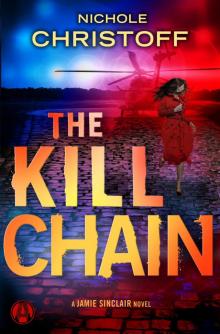- Home
- Nichole Christoff
The Kill Wire Page 5
The Kill Wire Read online
Page 5
But coiled around the doorstop gleamed heavy-gauge fishing line.
And I doubted the Prebles had put it there.
As clear as crystal and as strong as steel, the wire stretched from the doorstop on the back of the front door to the coat closet, standing open at the near side of the entrance hall. And strapped in this closet, onto two inverted chairs nabbed from the dining room, was a Beretta single-barrel shotgun. The fishing line threaded through its trigger guard.
“Marc!” I yelled. “Don’t move!”
But I’d voiced my warning too late.
Marc pushed the door open.
The wire jerked taut.
And the shotgun fired as Marc crossed the threshold.
The weapon’s load strafed Marc’s face. It blasted the door’s paneling. And shattered into dust.
Involuntarily, Marc had clapped a hand to his cheek. I seized his wrist, half certain flesh and bone would be gone behind it. But reason caught up with me and I drew his hand away.
“Rock salt,” I assured him.
Marc looked at his palm, dusted white with glittering powder and dappled with a few drops of blood.
“Someone,” I said, “wanted Elena’s attention.”
And I was willing to bet this was the same someone who’d wanted Elena to stay put in the trailer park. He or she had sent two men to ruin the wiring of Elena’s car to accomplish that task, but Elena hadn’t stuck around. And that made me wonder what else this someone had done.
Marc must’ve wondered the same thing the moment his eye fell on the congealing puddle of blood and traced it up the stair treads.
He drew his sidearm.
“Stay here,” he ordered.
“Nothin’ doin’,” I replied.
And mindful of more booby traps, I followed him up the steps.
Chapter 6
Single-file, Marc and I picked our way up the stairs. We avoided the blood that had turned rancid on the treads. The hallway above was narrow and dark, thanks to the closed doors lining both sides of it.
And the scent of death was overwhelming.
In front of me, Marc halted in the gloom. I slipped my cellphone from my jacket pocket, fired up the flashlight feature. We couldn’t risk slipping in the blood we could no longer see—or destroying what its pattern might tell investigators. I tilted the light, aimed it down the hall. The beam fell across a dark mound, and in my heart of hearts, I knew that mound was a human body.
Male, the analytical section of my brain said to itself. Late middle age. Definitely not Elena Preble.
And it wasn’t.
Burt Preble lay twisted on his side on the glistening hardwood floor, his life’s blood a blackening pool beneath him. A wound gaped wide where his throat used to be. The light in my hand glinted off metallic wire in that wound—a wire embedded nearly to the bones of his spine.
It had practically decapitated him.
Thick wooden handles, as wide as a man’s palm and cut from a broomstick or some such thing, threaded through the ends of the wire to tangle at the nape of Burt’s neck. This was a garrote—the tool of a practiced killer. And whoever had wielded it had meant business.
The sight of Burt Preble had Marc staggering to a stop in the middle of the hall.
“Holy Mary, Mother of God…” he whispered.
I swallowed hard to keep my stomach steady. But a soft rustling drew my attention to the end of the hall. There, the door stood open. Daylight filtered through it as if the blinds beyond had been drawn. And I was willing to bet they had.
“Call nine-one-one,” I ordered Marc. “Do it now.”
I crept past Marc and down the corridor. The blood trail ended with Mr. Preble, but I didn’t believe the killing had. Because, judging by the coffee mugs in the kitchen, Mr. Preble hadn’t been home alone when his murderer had come to call.
The room at the end of the hall had to be the master bedroom. I could make out that much from the doorway. Window valances in a sunset stripe shaded the windows and so did horizontal blinds. They were indeed shuttered tight. But the ambient light revealed red-to-black stains—and splatter patterns—on the pale carpet. And beside the neatly made bed lay a woman.
She’d taken quite a beating. Blood soaked her blouse and matted her dark curls to her misshapen head. Even her outstretched hand was caked with blood. She’d been reaching for the nightstand—and the phone. The cordless handset lay toppled on the tabletop where she must’ve knocked it from its base.
“Mrs. Preble?” I knelt beside her, felt for a pulse in her carotid artery.
Her skin was cold but still pliant.
Her stained fingers flexed.
Suddenly, I could breathe again.
“Hang on, Mrs. Preble. Help is on the way.”
I dragged the bedspread from the mattress, covered her to ward off shock.
Not that that would do much good at this point.
“Marc!” I shouted. “We’re going to need some EMTs in here!”
Marc appeared in the doorway.
And sirens wailed in the distance.
The paramedics who responded to Marc’s call got to work immediately on Helena Preble. And in the end, they probably saved her life. But Burt Preble hadn’t been so lucky.
As near as I could figure, he’d been dead for at least two days.
Naturally, Marc and I had a lot of explaining to do once the sheriff’s deputy who’d arrived at the Preble home got a look at the horrors of the second-floor corridor. And not even Marc’s credentials could keep us in the loop once half the department and the crime-scene investigation unit arrived. We were relegated to the driveway while the EMTs packed up Mrs. Preble and drove her away in an ambulance. In the meantime, a trio of deputies got the duty of keeping an eye on us. Not that they were obvious about it. But all three of them positioned themselves between us and the Santa Fe while they stood around in that nonchalant way that cops have.
Marc, on the other hand, paced the width of the drive like he was already measuring out his prison cell. He dialed Elena’s cellphone half a dozen times. She didn’t pick up and he didn’t leave a message.
But I had one for him.
“That mess upstairs,” I told Marc. “That has to be about more than Adderall.”
Marc nodded in wholehearted agreement. Because Adderall wasn’t a cash crop like opioids. The trafficking of it didn’t involve running risks in gang territories, crossing Mafia dons, or dealing with South American drug cartels. No, Adderall was a niche market, a dirty little secret hiding in suburban high schools, on college campuses, and in the firms and offices that hired young adults eager to get ahead. No one would go to the lengths we’d seen in the Prebles’ house over it.
“Is there something you haven’t told me?” I demanded. “Is there something more I should know?”
Marc rubbed the corded muscles in the back of his neck. “Like what?”
“Like do you think Elena could’ve traded one habit for another?”
Pissing off your friendly neighborhood heroin dealer led to the kind of carnage we’d seen in the Prebles’ home. Small-town meth producers had been known to get ugly, too, if someone stepped on their toes. If Elena had a predilection for chemical enhancement, maybe she’d given up on Adderall for something harder—and maybe she’d done more than that.
But Marc couldn’t confirm this theory for me.
Tapped out, he shook his head.
“Babe, I’d be the last to know.”
Now it was my turn to nod despite the humdinger of a headache that had begun to brew behind my eyes. The Colorado air was thin by Washington, DC, standards, and the adrenaline rush generated by the shotgun blast, garroting, and discovery of a woman at Death’s door were definitely aerobic activities. As a result, my lungs had come up short on oxygen and the rest of my body wasn’t too happy about it. Add in the stress of seeing Marc so troubled and it wouldn’t take much more to send me on my way to a world-class migraine.
When the sheriff him
self showed up, I took that as a sign that things were about to get much better. Or a whole lot worse. His deputy eagerly updated him on the situation before he visited the grim scene inside the house. Afterward, he took his time crossing the Prebles’ yard to come speak to me and Marc. When he reached us, he didn’t bother to introduce himself—and that only confirmed my theory.
“You’re not here on official business,” he began, fixing Marc with a cold, clear eye. “I know because I called your boys at the resident office here in town.”
The sheriff had to be past sixty, but he certainly hadn’t neglected his uniform like a government grunt with his mind on his nearing retirement. Rather, his black boots sheened with a spit shine and his tan shirt had been thoroughly starched. He probably routinely buzzed his iron-gray hair short at home. Recently, however, he’d missed a tuft. It poked out from the side of his head, just below the Stetson cocked forward over his brow. The tiny error made him seem more approachable somehow. And decidedly more human.
“I’m here for family,” Marc replied. “The Prebles are my son’s grandparents.”
The sheriff leveled a look at me. “But you’re not the Prebles’ daughter.”
“No,” I concurred. “I’m not.”
“You are a licensed private investigator,” he added, “though it seems you’re a bit far from your stomping grounds, aren’t you?”
This was true, and since he knew it, I didn’t feel any compunction to reply. The sheriff scowled at me a long moment, just to give me the chance to open my mouth and say something stupid. I didn’t take him up on the opportunity.
He turned his attention back to Marc. “The Prebles’ daughter…”
“Elena,” Marc offered.
“She’s what? Your wife? Your girlfriend? Your—”
“She’s my ex,” Marc said.
The sheriff’s scowl deepened. Because an intimate relationship could cast new light on what had happened to Burt and Helena Preble. Especially if that relationship was over.
The sheriff jerked a nod at the house. “You got a key to this place?”
“No,” Marc said.
“You call before you dropped by?”
“You know he did,” I said. “You probably saw his number on the Prebles’ caller ID.”
“That’s true.” The sheriff watched me closely. “Fact is, your boyfriend here—”
“My colleague.”
“—called the Prebles twenty-six times in the last three days.”
“Yes,” I agreed. “And it’s also a fact most of those calls were routed through cellphone towers on the East Coast. Because Special Agent Sandoval didn’t arrive in Colorado Springs until last night.”
The sheriff’s scowl twisted. He didn’t like my reminding him that Marc was a federal agent. And, therefore, Uncle Sam considered him trustworthy.
“Look,” Marc said to the sheriff, “I’m being straight with you. Now you be straight with me. How’s Helena and when can I see her?”
“EMTs say if she’d lain there much longer…” The sheriff shook his head. “You’re lucky you found her when you did. So now you tell me: why’ve you been blowing up the Prebles’ phone and why did you fly out here in such a hurry to see them?”
Marc huffed a hard sigh, ran a hand through his black hair, and I knew he’d answer the sheriff’s question.
He just might not answer it fully.
“Elena was supposed to pick up our son after Spring Break. When she didn’t show, and she didn’t answer her phone, I flew out to make sure she was all right.”
“Well?” the sheriff pressed. “Is she all right?”
“I don’t know. I can’t locate her.”
“You call her since you got here? You been to her place?”
“Yes and yes.”
“I take it you didn’t find a rigged shotgun in her closet.”
“No.”
The sheriff nodded grimly. “You bring that shotgun here with you today?”
“And set it up to fire rock salt at my own face? No. I didn’t bring the garrote that nearly took Burt’s head off, either.”
Marc turned green as he said it.
And the sheriff’s sunken cheeks turned pink.
Still, he said, “You know anyone who’d want to strangle the life out of him?”
“No.”
“You know anyone who’d want to beat that woman to a bloody pulp?”
“No.”
“You drill the deadbolt out back to gain entrance to the premises?”
“No.”
The sheriff hooked his thumbs in his gun belt, squinted at Marc as he weighed the results of this rapid-fire Q-and-A.
“You gonna come running if I call you, Agent Sandoval?”
“Yes.”
“All right. Get going. Take Miss Sinclair with you.”
The sheriff didn’t have to tell us twice. As straight as the crow flies, Marc and I headed for our SUV, still parked on the street. From their own driveways and along the sidewalk, throngs of neighbors gaped at us in wonder.
Deep in the crowd, I spied a man and a woman in charcoal gray. They’d lingered outside Cody’s school just that morning. And both had evaporated when Marc put in an appearance. Now both appeared profoundly interested in the happenings at the Preble house. And in Marc and me.
“Hey.” I halted one of the deputies who’d kept watch on us from a distance. “Are those two suits with your department?”
“What suits?” he asked.
Marc echoed him. “What suits?”
I scanned the crowd. “Fourth row back. Charcoal tailoring. Expensive shades.”
“I don’t see anyone matching that description,” the deputy admitted.
“Where?” Marc asked.
“They’re right there,” I insisted.
Except no matter how hard I looked, by now, they weren’t.
Chapter 7
The waiting room of Mountainview Community Hospital smelled like wildflowers—if those wildflowers had grown on the sunny slope below a petroleum refinery. The artificial scent of honeysuckle, sweet pea, and black-eyed Susans might’ve been working hard to mask the scent of industrial-strength cleaning agents—and I was glad to know I probably wouldn’t contract strep, rabies, or the bubonic plague during my visit to this public health facility—but the strong chemical odor also persuaded my altitude-induced headache to pound louder. Just as the attacks on Elena’s parents made my job harder.
Whoever had killed Burt Preble had allowed Helena to survive. To my mind, that meant the attacks were a message. Whether Elena would get that message, I couldn’t say. But, being a law enforcement officer, Marc had heard it loud and clear.
Marc had said nothing since the sheriff released us. And I wasn’t sure he could. As we raced to the hospital, Marc’s mouth remained so tightly closed, the muscles along his jawline rippled every time I glanced at him.
We hit the emergency room’s admissions desk like a cyclone, where we learned that Helena had been taken to intensive care. Instantly solemn and sympathetic, the attendant conducted us to a family waiting room outside the unit’s swinging doors. And while Marc paced in front of a bank of windows that overlooked an open-air atrium filled with evergreens, I ducked into the ladies’ room to fetch him a damp paper towel.
“Here,” I said, offering it to him when I returned. “Pat your face.”
Marc didn’t stop prowling for an instant. “I’m all right, babe.”
“I know,” I assured him—even though he wasn’t. “But you don’t want Cody’s grandmother to see you covered in salt crust and dried blood. And you don’t want Cody to see you that way, either.”
That statement got Marc’s attention. He stopped in his tracks. And like a man stepping into the cool shade after an afternoon under a blazing sun, Marc blinked at me.
He didn’t pull away when I reached for him, when I cradled his chin with my palm. Gently, I touched the chilly towel to his cheekbone, wiped away the glittering particles peppe
ring the nicks in his skin. And all the while, Marc gazed at me as if he’d never seen me before.
“Jamie,” he said. “When this is over, and you and I are back in Washington, I want—”
But Marc had to hold that thought. Because with a thump, the doors to the ICU swung open. A doctor, in green surgical scrubs and a white lab coat smeared down one side with robust stains that looked suspiciously like Helena Preble’s blood, shuffled into the waiting room.
The doc’s eye zeroed in on Marc’s hip—and the handgun holstered there.
“Federal agent,” Marc said, as if that explained everything.
And maybe it did.
“Well, Agent, it’s a good thing you happened on Mrs. Preble when you did. She sustained quite a beating. Her right wrist, three ribs, and her nose are broken. She got clobbered over the head with a hell of a heavy object, too. With the skull fracture she’s got going on, I don’t know how she escaped a massive cerebral hemorrhage, but she did. She’s concussed, of course, but she’s not bleeding internally.”
“Can I see her, Doctor—”
“Ekhardt. You can. Don’t be alarmed if she doesn’t rouse or speak. We’ve sedated her, given the extent of her injuries, and the fact that she probably witnessed her husband’s…death.”
Murder, I thought. Practical decapitation. But the doctor couldn’t bring himself to say those words. Not even to a federal agent.
With the good Dr. Ekhardt leading the way, I shadowed him and Marc to the business side of the swinging doors. The lights had been turned low. Nurses hustled and bustled with the hush of those attending the very ill and severely injured. When we drew near a particular curtained cubicle, the doctor patted Marc on the shoulder. And then he left us on our own.
Against the stark white sheets of the hospital bed, Helena Preble was a shadow of a woman. Her sunken eyes were with ringed with black bruises and a wealth of gauze swaddled her head. Plaster encased her right arm while tubing ran into her left, and in the unnatural silence of the ward, the steady beep, beep, beep of the monitor marking her heartbeat was an eerie interruption.

 The Kill Wire
The Kill Wire The Kill Box
The Kill Box The Kill Radius
The Kill Radius The Kill Shot
The Kill Shot The Kill Chain
The Kill Chain The Kill List
The Kill List